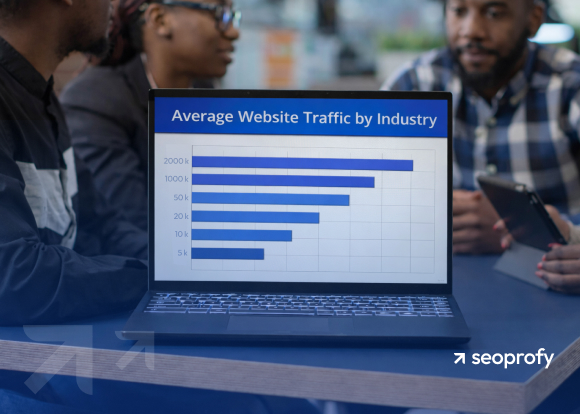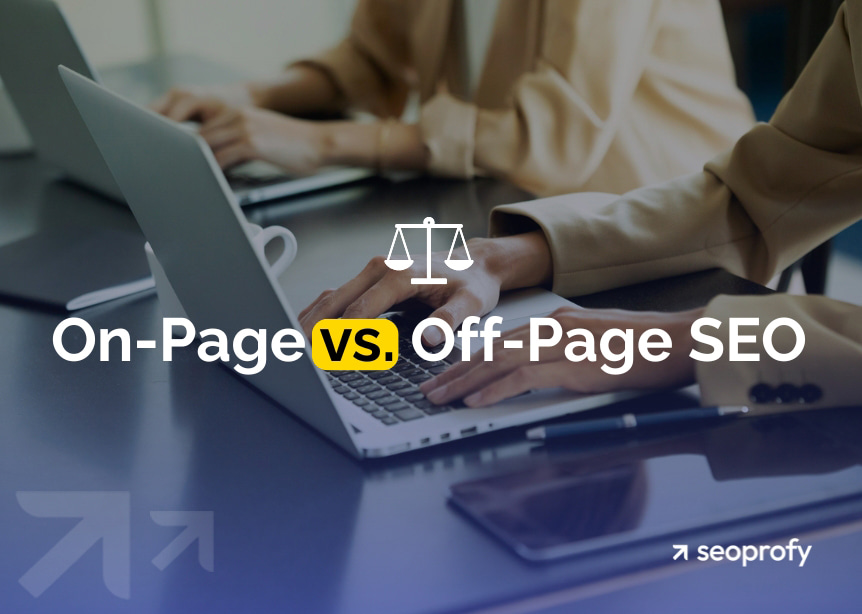Wondering why your eCommerce site doesn’t drive much traffic? You’re not alone. In fact, a staggering 96.55% of web pages receive zero clicks. While you might have already invested time and resources into your SEO campaigns, one critical overlooked element can instantly undermine your efforts: eCommerce link building strategies.
The online marketplace is increasingly saturated, with new eCommerce sites popping up daily. As competition grows, having a solid online presence is a must. Here’s where link building for eCommerce websites makes all the difference for your website’s search engine optimization (SEO) strategy.
However, achieving this goal without effective eCommerce link building tactics in your arsenal is challenging. Keep reading and discover effective, tried-and-true strategies to establish domain authority and drive measurable results.
- Backlinks are a major factor in determining your website’s visibility in search engine result pages (SERPs). The latter is where potential clients look for products.
- When developing a personalized eCommerce link building strategy, prioritize relevance, authority, and diversity as chief attributes of high-quality backlinks.
- Building a strong backlink profile for an eCommerce website is challenging due to high competition and constant product updates.
The Basics of eCommerce Link Building
ECommerce link building refers to acquiring high-quality backlinks from credible, topically relevant websites to boost your online store’s search engine ranking. As an integral part of SEO, backlinks signal that your website is authoritative and provides trustworthy content. These factors help you gain visibility in SERPs.
And here’s the crucial part: the higher your website’s search ranking, the greater the odds that more potential customers will visit your site, converting clicks into sales.
What Makes Link Building Crucial for eCommerce?
The primary objective of eCommerce businesses is to convert a click into a sale, as has been mentioned. However, how do you withstand intense competition and introduce your eCommerce website to the right audience to achieve this desired result?
Here’s where eCommerce SEO link building makes all the difference. Having other websites link to your store in their blog posts and other forms of digital content helps get more brand mentions and gain more domain authority.
The importance of link building isn’t just a short-term trend — 92% of marketing professionals assume that it will remain a critical factor in Google’s search engine algorithm over the next 5 years. This shows just how essential building inbound links is to your long-term SEO strategy.
However, not all backlinks present the same value. While high-quality associations from reliable sources are likely to improve your ranking, low-quality ones can undermine your website’s performance.
Essential Elements of a Strong Backlink Profile
A strong backlink profile is key to maximizing SEO success. That’s why consulting an expert agency for link building services could be a great starting point. At the same time, you need to understand the following. High-quality backlinks are characterized by three primary attributes: relevance, authority, and diversity.
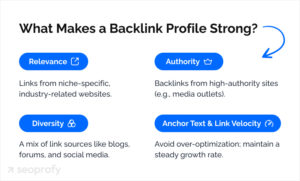
- Relevance: Backlinks from websites related to your industry or niche are a must. For an eCommerce store, links from niche-specific websites will attract qualified traffic — potential customers interested in your products.
- Authority: The credibility of the sites linking to you matters. High-authority websites, such as established industry leaders or reputable media outlets, pass on more link equity and boost your store’s search rankings.
- Diversity: A natural backlink profile requires diversity in link sources. Gaining links from a mix of blogs, forums, social media, and industry-specific sites shows search engines that your store is gaining attention from varied sources.
- Anchor text & link velocity: Maintain anchor text variation to avoid over-optimization. Also, ensure a steady rate of backlink acquisition (link velocity) to avoid triggering penalties for unnatural link building practices.
The Groundwork for Successful Link Building
Any successful link building campaign consists of three consecutive stages:
- Assessing existing backlinks
- Identifying the most relevant pages for backlinks
- Setting clear objectives and criteria for measuring the efficacy of your eCommerce link building strategies
Audit Your Existing Backlinks
The first step in building a potent backlink portfolio is a comprehensive backlink audit to determine the strengths and weaknesses of the current eCommerce link building strategy.
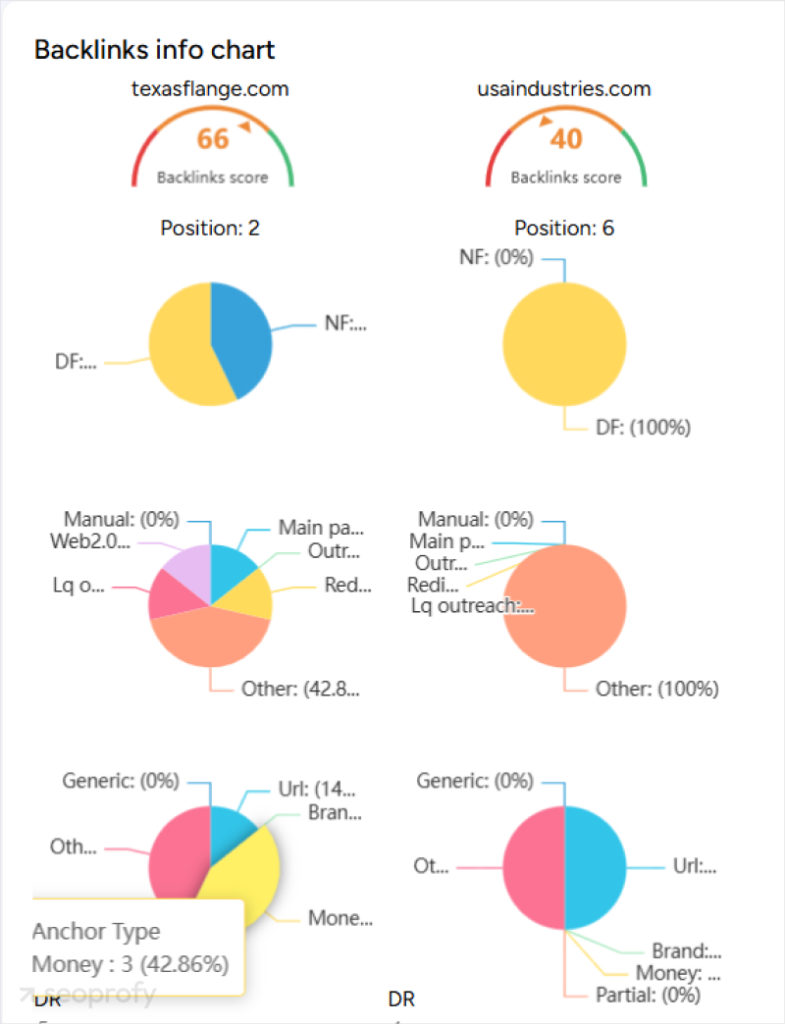
Start by analyzing your existing backlink profile through Ahrefs, Moz, or Search Analytics. These tools will also help you assess the authority and relevance of the sites linking to you, which is crucial for your backlink profile’s health. Eliminate any low-quality or irrelevant inbound links. Plus, ensure your content offers value to potential visitors and other websites that can be reached out to for cooperation. Additionally, assess your competitors’ online presence by analyzing their link building tactics.
Identify the Best Pages for Backlinks
When building an effective link profile, focus on link-worthy content — pages that offer the highest value for backlinks. Start with category pages, as they are crucial entry points for potential customers. Optimize these with relevant keywords and compelling content to attract backlinks.
Next, prioritize high-converting product pages, which are essential for turning visitors into customers. Although they may attract fewer inbound links, adding elements like customer reviews and detailed product descriptions can boost their potential.
Finally, resource hubs, such as guides or blog posts, are ideal for earning backlinks. These pages provide value and are likely to be referenced by other sites.
To identify these pages, use tools like Google Analytics and Google Search Console. Look for pages with high traffic but low conversions — optimizing these can improve both SEO and engagement and make them more likely to earn quality backlinks.
If you’re uncertain where to begin, consider the SEO guide for eCommerce to help you out.
Set Clear Goals and Metrics for Success
Finally, set clear objectives for your eCommerce link building campaign. Focus on the following metrics:
- Backlink quality: Track the number of backlinks from websites with a domain authority of 50+ using such SEO tools as Ahrefs or Moz.
- Keyword ranking: Monitor any ranking improvements for 5-10 targeted keywords using Search Console.
- Conversion rate: Analyze the leads and sales from referral traffic in Google Analytics.
- Link acquisition rate: Set an achievable yet growth-oriented goal, e.g., acquiring 10-12 new high-quality backlinks monthly.
Proven Strategies for eCommerce Link Building
Approaches to link building for eCommerce websites might take different shapes and forms. However, by implementing time-tested strategies that have delivered measurable results for other eCommerce stores, you can enhance your chances of achieving higher search rankings. Here are a few tactics worth considering.
Product Reviews and Influencer Marketing
There’s no denying that the majority of customers check product reviews before committing to a purchase. Hence, such insights are a cornerstone of their decision to buy your product.
Leverage this opportunity to create insightful and trustworthy product reviews. Here, influencer marketing comes in handy. Encourage bloggers and customers to write reviews that link to your product pages. Consider collaborating with niche influencers to create authoritative content in such formats as unboxing videos or tutorials.
Digital PR and Outreach
Digital public relations (PR) is a sure way to supercharge your link building efforts and open opportunities for collaboration with other websites and influencers.
Essentially, digital PR allows you to secure high-quality links from websites with notable domain authority. Consider cooperating with credible media outlets by pitching valuable data-driven content or unique stories. Don’t overlook the potency of corporate social responsibility (CSR) campaigns or stories of your brand’s milestones to attract media attention.
Contribution to Niche Authority Sites
One of the most effective link building tactics for eCommerce brands is guest posting. This strategy presupposes creating content for other credible and topically relevant websites in your niche.
Start by researching relevant sites with high Domain Authority (50-60) and decent SEO metrics, such as keyword rankings and organic search traffic. These indicators signal the website’s ability to drive traffic and provide valuable backlinks. Then, reach out to site owners and pitch guest posts of value.
Content Ideas to Attract Links
High-quality content is the foundation of any successful SEO approach, with diversity being equally important to ensure your eCommerce website serves as a strong conversion funnel. Below are different content types that can help you earn credible links pointing to your site.
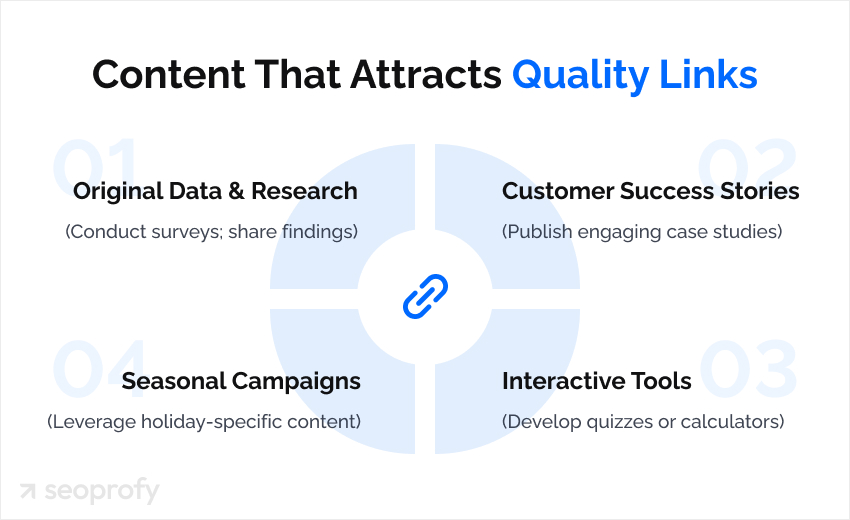
Publish Original Data and Research
Any linkable asset other website owners would potentially want to host on their platforms must offer valuable insights. How often do you visit a webpage and notice authors using statistical data at the beginning of an article to support their claims? Isn’t it almost always presented as a clickable link?
To build similar assets, consider conducting surveys or research relevant to your industry to come up with unique insights other credible sources would like to highlight on their platforms. Additionally, create visually appealing and informative infographics to showcase your findings, making them more shareable. As an option, offer downloadable versions of your research findings to encourage backlinks.
Share Customer Success Stories
Testimonials and product reviews are building blocks of a trustworthy relationship with your audience. Consider sharing customer success stories to get better media coverage and drive organic traffic to your website. For example, publishing engaging success stories can attract attention from credible blogs in your industry, thus increasing the likelihood of earning backlinks to your website.
Remember that search engines focus on genuine and informative user-generated content as a chief metric of your website’s credibility. Hence, your clients’ feedback is invaluable in gaining better visibility in search engine result pages.
Create Resource Hubs for Your Niche
Another content idea is to design thorough guides, toolkits, or glossaries specific to your industry to strengthen your domain authority. These assets can serve as valuable tools for your audience, while also attracting backlinks from other websites.
For instance, if you run an online automobile repair shop, consider offering free auto repair manuals. These could cover topics, such as detecting faulty brake pads, replacing wiper blades, and changing fuel filters, all of which are highly relevant to your audience.
You can improve the user experience and get more focused traffic by putting these tools on pages that are specifically related to your goods and services. Visitors can access these tips even when they’re not online if you offer downloaded versions. This adds value to your site and encourages backlinks.
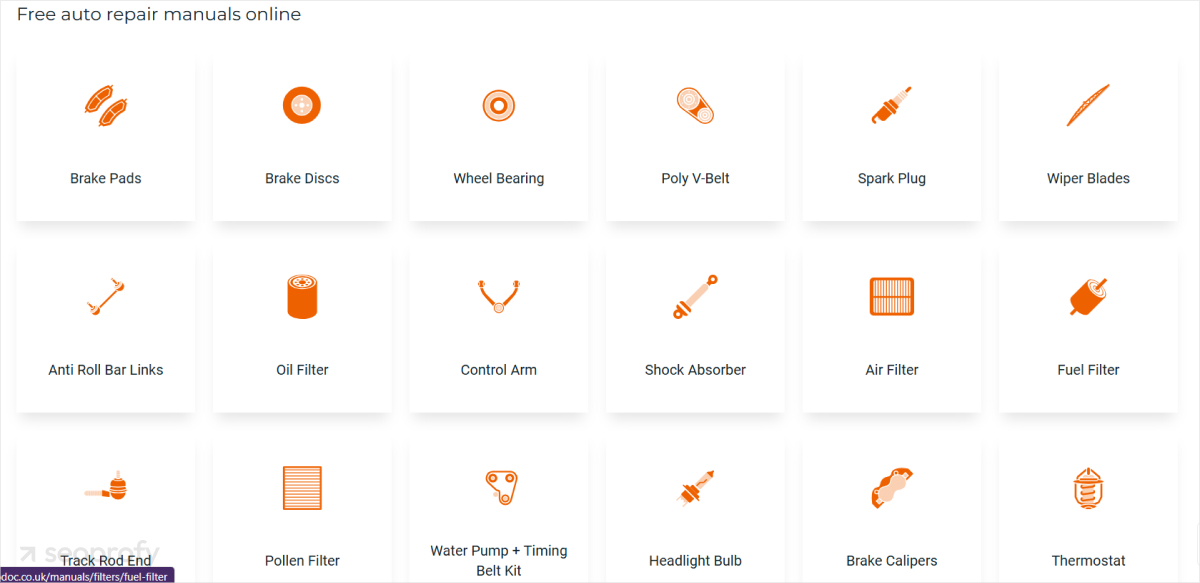
Unique Link Building Strategies for eCommerce
As mentioned above, ensuring the diversity of your content is key to transforming it into linkable assets. The same goes for developing effective link building tactics for eCommerce brands. A diverse backlink portfolio allows you to test different strategies and find those that work best for your business. Consider the following examples to get inspired.
Partner with Local Businesses
Having a strong network of reliable partners is crucial for success in online retail. One strategy to consider is collaboration with local businesses. It presupposes endorsing your partners’ products or services on your platform while they promote your business in return.
For example, if you run an online clothing store, consider partnering with a local apparel brand with a solid online presence. It’s a win-win partnership, as you’ll host external links to their websites and they’ll host yours.
Leverage Seasonal Trends to Earn Backlinks
Promoting holiday-specific trends is another effective way to earn backlinks. To make this strategy work, analyze what seasonal content would fit your eCommerce SEO link building model.
Besides, here’s the time to leverage the power of shareable content, e.g., a blog post set with gift ideas. Align your promotional campaigns with major events, e.g., Cyber Monday and Christmas, and prepare informative content for media outlets to link back to.
Use Interactive Tools like Polls or Calculators
Depending on the industry you operate in, it might be feasible to develop a helpful tool such as a quiz or calculator to assist your audience in solving a certain problem.
By offering your website visitors valuable information for free, you stand out from other eCommerce brands in your industry. For example, if you’re an online clothing retailer, consider designing a quiz to assist your clients in picking the right outfit for a specific occasion they have in mind.
These interactive tools are powerful assets for building backlinks, as they offer unique, engaging, and shareable content that attracts natural links from other websites.
Advanced Tactics for Link Acquisition
If you’re looking for advanced eCommerce link building strategies, here are a few other ways to acquire credible and authoritative backlinks.
Build Connections Through Community Events
Community events, either charitable or corporate, are great opportunities to build business connections. You might host or sponsor workshops or webinars to increase brand visibility and earn backlinks.
Similarly to influencer marketing, partnerships with community leaders and organizations open new venues for promoting your online store. Once again, don’t underestimate the role of shareable content. Create blog posts about events and feature high-quality infographics, e.g., photo galleries, to encourage attendees and partners to link back to your site.
Encourage User-Generated Content
Once again, user-generated content (UGC) can make all the difference in link building for small eCommerce sites.
Not only does UGC serve as clients’ votes of trust, but it also takes the weight of creating all the content off your shoulders. To maximize the UGC potential, consider setting up regular contests among your clientele to encourage customers to submit reviews or stories featuring your products. Then, create a dedicated webpage where you showcase the best submissions or share them on your social media channels.
Offer Affiliate Programs to Earn Backlinks
Affiliate links have become a trusted marketing approach. And it still rings true. As a website owner, you should actively pursue affiliate partnerships if they align with your business goals and can drive valuable traffic and backlinks.
Essentially, it can become a valuable part of link building for small eCommerce sites. As you encourage potential partners to share links to your site in exchange for a commission from sales. To make the most of this strategy, provide your affiliate partners with promotional banners, text links, and ready-made blog content. Use tracking software to monitor affiliate performance and ensure that the backlinks you’re earning are of high quality and contribute to your SEO goals.
Technology Use to Improve Link Building
Integrating high-performance tech tools will boost your eCommerce link building efforts. Hesitant about where to start? First, consider the following tips on how to leverage technology to enhance your link building strategy.
Find High-Value Link Opportunities with AI
SEO tools like Moz, Ahrefs, and SEMrush can significantly enhance your ability to identify high-value backlink opportunities. These provide detailed insights into potential inbound links, such as identifying websites with strong domain authority or content that is highly relevant to your niche.
While AI is not the core function of these tools, machine learning and advanced algorithms within them can help uncover link opportunities more efficiently. For example, these solutions analyze backlink patterns and SEO metrics to highlight websites that are worth targeting for link building.
Beyond that, AI can still come in helpful. It can help you streamline communication with backlink partners by developing examples of personalized offers that highlight the mutual benefits of such cooperation. AI-powered tools are invaluable for developing tailored content that appeals to potential backlink partners. More than that, they can help align content with your SEO objectives.
Automate Outreach While Keeping It Personal
Let’s agree that it makes sense to reach out to as many credible and topically relevant websites as possible to secure enough business connections. And that’s why automating your outreach efforts is essential.
Pitchbox and BuzzStream are excellent examples of user-friendly software that enable personalized, scalable email outreach for link building. These tools help automate the outreach process and provide valuable insights by tracking key metrics like open rates and response rates. This information, in turn, allows you to refine and optimize future campaigns for better results.
Track Competitor Backlinks and Capitalize on Gaps
To improve your backlink profile, start by monitoring competitor backlinks using tools like SpyFu or Majestic. These can help you identify the domains your competitors are already linked to. While acquiring links from these domains can be valuable, don’t forget to look for untapped opportunities that can give you an edge over competitors and expand your advanced eCommerce link building strategy.
One effective tactic is the ‘broken link’ strategy, where you replace inactive competitor links with your own relevant content. Identify unlinked brand mentions or other relevant content on high-authority websites that could be replaced with a link to your eCommerce store. Remember, this process requires thorough research and personalized outreach to build links of high quality.
The link building strategies that work today may not necessarily be as effective tomorrow, so it’s essential to build a flexible, future-proof campaign.
One of the best ways to navigate this dynamic environment is to partner with an expert eCommerce SEO company. Such cooperation will help your website:
- Get a higher search engine ranking
- Gain better visibility
- Boost conversion rates
Account for Google’s Algorithm Evolution
It’s no secret that Google’s search engine algorithms are continuously evolving. It might be tough to keep up with constant updates. However, some aspects are likely to stay prioritized.
One such principle is the delivery of relevant value-packed content. While algorithms are likely to change, the high quality of your content will always be a golden standard of any effective link building strategy.
Conclusion: Build a Sustainable SEO Foundation
Establishing a strong online presence is inconceivable without a relevant long-term SEO strategy. The latter relies heavily on a potent backlink profile. Any website seeking to optimize its performance must opt for sustainable link building strategies.
So at the end of our guide, we’d like to summarize three key principles of effective eCommerce link building. First, focus on delivering high-quality content that brings value to your partners and clients. Second, leverage existing technology to streamline time-consuming processing and drive actionable results. Finally, adapt to changes in SEO principles to stay competitive in your industry. Integrating these rules into your eCommerce website’s strategy for building links will drive actionable results and improve your business performance.






